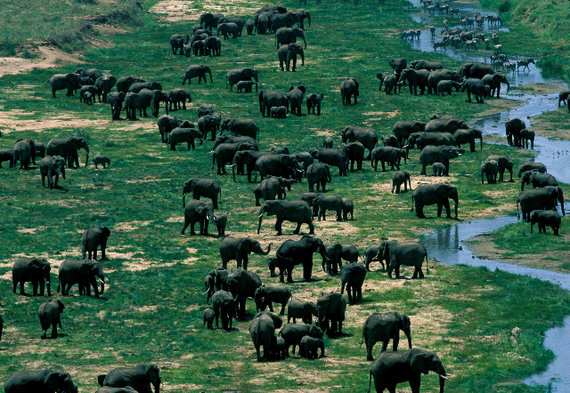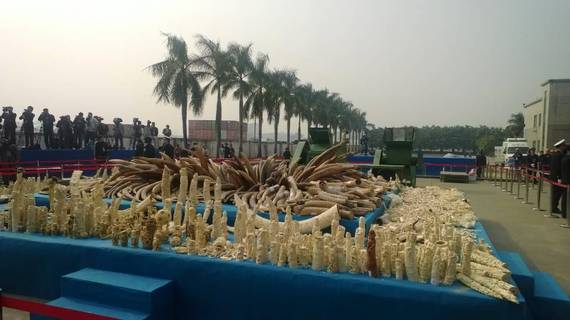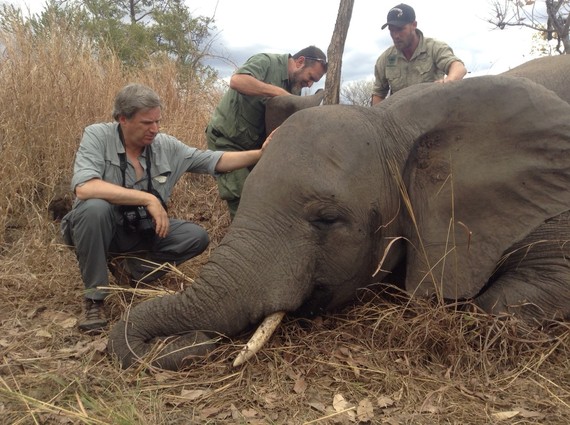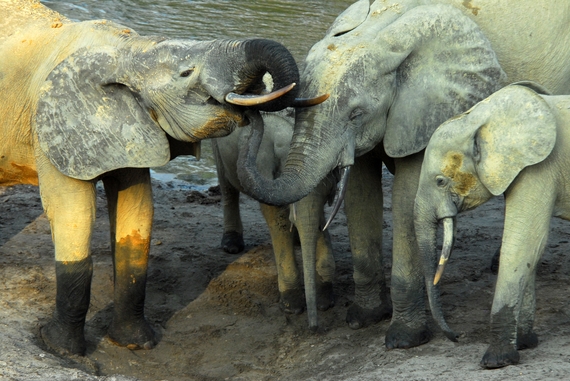By Susan Lieberman and Simon Hedges
The price of illegal raw ivory in China has almost halved since mid-2014, according to new research to be published by Save the Elephants. The survey by Esmond Martin and Lucy Vigne shows that price of raw ivory had tripled in the four years to 2014, reaching an average wholesale price of US$2,100/kilogram. By November 2015 that price had dropped to $1,100.
While this news is tremendously encouraging and should give us hope that the rampant illegal killing of Africa's elephants - driven largely by demand for their ivory -- may eventually fall significantly across the continent, the story is not as simple as it might seem at first glance.

Although consumption of ivory appears to be falling in China, it is essential that governments and the conservation community continue to invest in demand reduction initiatives. Photo by Charles Foley ©WCS.
We agree that there has been a significant drop in prices - WCS's monitoring work also shows ivory prices dropping in Vietnam and China - but it is important to note that we are only talking about a relatively short period of lower prices rather than a prolonged trend; prices could climb again.
Martin and Vigne suggest the price fall results from the Chinese government's stated intent to close China's domestic ivory market, growing awareness in China about the impacts of buying ivory, and the slowdown in the Chinese economy.
All of these factors are likely to have contributed to the price fall. But as with any commodity, the drop may also be influenced by a surplus in supply and we know that elephant poaching continues unchecked in too many places in Africa and that much of the resulting ivory flows to China.
We know that elephant poaching continues unchecked in too many places in Africa and that much of the resulting ivory flows to China. Photo by Alastair Nelson ©WCS.
It is encouraging to think that demand reduction campaigns, including those run by WCS, are beginning to have an impact. Indeed one of the most interesting points emerging from the new study was the lack of buyers seen by the researchers.
It is unclear, however, whether this reduction in visible signs of consumption is due to a genuine reduction in the desire to purchase ivory or whether it might also be explained by other more complex factors (e.g., falls in the consumer confidence index and reaction to government actions). Indeed, the carvers and retailers told Martin and Vigne that the economic slowdown - together with the government's anti-corruption campaign - had hit the ivory trade hard.
We should also recall that much ivory in China is now traded on the internet, including through social media, not in conventional retail outlets. But even if demand reduction work is having an effect we have not reached the 'job done' point yet and consumption of ivory remains a problem in China. It is essential therefore that governments and the conservation community continue to invest in demand reduction initiatives, along with anti-poaching, anti-trafficking, and policy work.
Earlier this year the Chinese government announced that it will phase out the commercial domestic ivory trade. This welcome announcement was made during the ivory crush in Beijing in May and reiterated during President Xi's trip to the US in September.

After conducting its second crush of confiscated elephant ivory in May of this year, the Chinese government announced that it would be phasing out its commercial domestic trade in ivory. Photo ©WCS China.
While these announcements were rightly hailed as 'game changers', some experts feared that announcing an impending ban without an implementation timetable might fuel a spike in demand (and a spike in ivory prices and elephant poaching). Fortunately, the Martin and Vigne study indicates such a spike did not happen.
In fact, work commissioned by WCS suggests that the price of ivory had already begun to fall in China before May's announcement, so the new study suggests this welcome trend has continued throughout this year, driven and maintained in part, we believe, by the policy changes signaled by the Chinese government.
We know from experiences around the world with ivory and other wildlife products that bans by themselves are insufficient. There must be a combination of effective law enforcement at key wildlife sites, properly enforced trade bans to prevent illegal ivory being sold under the cover of legal trade, and sophisticated demand reduction work.
Even if demand reduction work is having an effect we have not reached the 'job done' point yet. Photo by Andrea Turkalo ©WCS.
Thus the Chinese Government's highly welcome announcements should not be seen as rendering demand reduction unnecessary or even less important, but rather as significantly strengthening the responses already in place.
While the decline in the price of ivory is highly positive, we must be cautious about claiming a significant permanent reduction in demand for and consumption of ivory in China with the resulting reduction in threats to elephants.
Instead, we should take the welcome news as an opportunity to continue to push for substantive policy change and enforcement: implementation of the promised domestic ban as soon as possible. Only then will we be able to say with confidence that elephants have the chance to recover from the poaching crisis.
--
Dr. Susan Lieberman is Vice President for International Policy at WCS (Wildlife Conservation Society). Dr. Simon Hedges is WCS Elephant Coordinator and Ivory Trade Policy Analyst.


